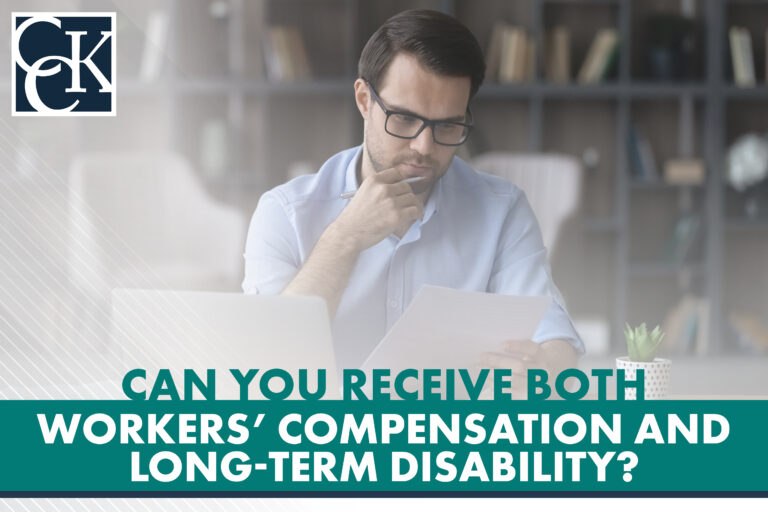Can You Receive Both Workers’ Compensation and Long-Term Disability?

Workers’ compensation and long-term disability (LTD) each can play a vital role in providing financial stability when you suffer an injury or illness.
- Workers’ compensation provides benefits for recovery from work-related injuries or illnesses, potentially including partially lost wages, medical expenses, retraining, and more.
- LTD provides significant wage replacement if you are unable to work due to long-term or permanent medical conditions, regardless of whether the original illness or injury was work-related or not.
Given that these benefits do not overlap completely, you may wish to apply for LTD benefits even if you are receiving workers’ compensation. However, the benefits you receive may depend on several factors. In this article, we will discuss common issues and questions.
What Is Workers’ Compensation?
Workers’ compensation, also known as “workers’ comp,” is a disability benefits program mandated by each state and the U.S. government. These benefits protect employees who suffer injuries or illnesses during the course of their employment.

The requirements for workers’ compensation vary from state to state. Workers’ compensation benefits can cover up to two-thirds of an injured worker’s income. These benefits are typically not taxable. However, taxes may be applicable in certain situations, such as if, for example, the person is also receiving Social Security Disability Insurance (SSDI) benefits or Supplemental Security Income (SSI).
Examples of other potential workers’ comp benefits include payment of:
- Medical bills
- Rehabilitation expenses
- Disability pay
- Funeral costs (in some instances)
- Retraining costs for those who face permanent job incapacity
- Death benefits for the surviving spouse
How Are LTD Benefits Different from Workers’ Compensation?
While workers’ compensation is required in virtually all states, there is no such requirement for businesses to provide long-term disability to their employees. However, many employers do provide long-term disability insurance and individuals can also purchase an LTD policy directly from an insurance company.

Unlike workers’ compensation, long-term disability benefits are not confined to work-related injuries or illnesses. Instead, LTD benefits provide financial support when an employee is unable to work due to any form of injury or illness.
Long-term disability benefits commonly protect between 60 and 80 percent of a person’s pre-disability earnings. However, this can vary based on the specific insurance policy. For instance, some policies may only cover 50 percent of a person’s income.
The duration of LTD benefits can also vary, from two years or less to several decades. Some policies may offer coverage to eligible claimants until a specific age—usually age 65. In contrast, workers’ compensation continues until the employee can return to work or reaches maximum medical improvement.
Most long-term disability policies have a “waiting period.” The waiting period, or elimination period, commonly lasts 90 to 180 days. During this period, individuals do not receive LTD benefits, even if their claim has already been approved. Workers’ compensation benefits start immediately after an injury.
Long-Term Disability Can Be Offset (Reduced) by Workers’ Compensation Benefits
When a work-related illness or injury is severe enough to warrant a prolonged absence from work, it is possible to receive both workers’ compensation and LTD benefits.
However, receiving benefits from both sources can lead to a reduction in the amount paid out from one or both programs. This is because most long-term disability policies have offsets.
Generally, offsets are amounts a claimant is receiving from other sources that reduce the amount of LTD benefits that are payable. Workers’ compensation is often included in such policies as an offset.
Note that this offset can occur retroactively. For example, if your workers’ compensation benefits were delayed (e.g., by an initial denial), and your LTD insurer paid full benefits during this period, then when you finally receive your worker’s compensation benefits, your LTD insurer may require you to pay them back what they overpaid. Offsets can vary from policy to policy, so it is important to read your LTD policy carefully.

Even With Offsets, It May Still Be Beneficial to Apply for LTD
Even with the offset, it’s still beneficial to apply for both benefits.
- LTD policies may provide additional compensation on top of workers’ compensation and your employer may have auxiliary benefits for employees who are on approved LTD, like continued health insurance for your family.
- If you are denied either workers’ compensation or LTD benefits, you might still receive benefits from the other, providing some stability. For example, your injury may be deemed not work-related, which would preclude workers’ compensation but not LTD benefits.
- Depending on your state and LTD policy, workers’ compensation may end earlier than LTD benefits. If you wait to apply for LTD benefits until your workers’ compensation benefits end, you may miss a claim deadline in your LTD policy.
CCK May Be Able to Help You with Your Long-Term Disability Claim
While you can technically receive both these benefits concurrently, the interaction between the two benefits can be complex. Consulting with an attorney experienced in both areas is recommended to maximize your overall compensation.
If you need help with your long-term disability claim or appeal, then CCK may be able to help. We have been helping long-term disability claimants since 1999 and may be able to help you too. Call us today at (800) 544-9144 for a free case evaluation with a member of our team.
About the Author
Share this Post
